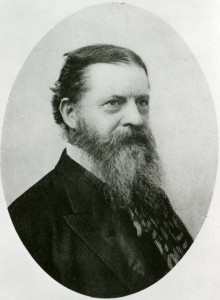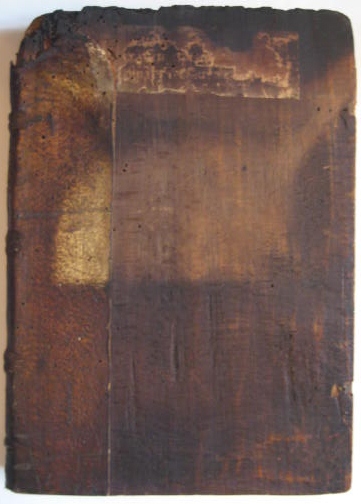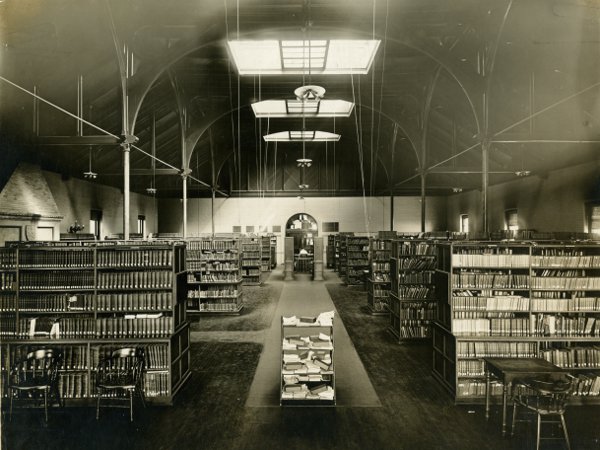“On the evening of September 17, 1908, the library suffered a loss…on the building [and]…contents by a fire which started in the south end of the so-called ‘stack-room,’ occupying the northwest corner of the fourth floor of McCoy Hall…The corridor leading to the Main Library and also the loft and tower above this floor were ablaze, but the prompt response of the city’s Fire Department and its efficient action on the scene secured a check before any considerable exit thru the roof or an entrance into the Main Library was made…”
“One collection of great interest…suffered badly, viz. that of 305 volumes in logic, scholastic philosophy, etc., collected by Professor C. S. Peirce and purchased by the Library in 1881. The old contemporary bindings – some incunabula – must go, tho the text is in the main still available but shorter lived.”
M. L. Raney, “Report of the Librarian” Report of the President of The Johns Hopkins University, Baltimore, Maryland, 1909, pp. 77, 78.

Charles Sanders Santiago Peirce was a logician, mathematician, chemist, astronomer, geologist, and philosopher and had come to Hopkins in 1879 as a lecturer in logic and philosophy. He had been elected to the National Academy of Sciences in 1877 in recognition of his contributions to the fields of astronomy, mathematics, and physics while with the U.S. Coast and Geodetic Survey. He is still considered one of the foremost American philosophers and is credited as the founder of pragmatism. While at Hopkins, Peirce established the short-lived Metaphysical Club, an outgrowth of a similar discussion group in Cambridge, Massachusetts, of which he was an active participant.
The Johns Hopkins University purchased Peirce’s library of 305 volumes in 1881, including three manuscript books and 31 incunable volumes. The scope of the collection ranged from a 12th century manuscript book of Peter Lombard’s Sententiae to many 19th century editions published during Peirce’s lifetime, and included editions of such notable philosophers as Aristotle and Aquinas, as well as Duns Scotus, Leibniz, Hegel, and Kant. The collection in its entirety cost the University $550.
Peirce left Johns Hopkins in 1884 and returned to his scientific work with the Coast and Geodetic Survey. He was reputed to be a difficult colleague and perhaps too complex to be an effective teacher; his parting with the University was not a congenial one.
Peirce continued to correspond with President Daniel Coit Gilman and the Head Librarian at Hopkins, William Hand Browne, in an attempt to repurchase his collection. He wished to have the books back in his possession to facilitate his research on the history of philosophical terminology. The correspondence continued until 1901 and ultimately ended in the Board of Trustees’ decision not to resell the collection.

Peirce’s books were housed with the rest of the library in the original McCoy Hall, located on Hopkins’ first campus at Howard and Monument streets. In September 1908, when the stack room in McCoy Hall was severely damaged by fire, many books were scorched and a few completely destroyed. Despite the discouraging tone of the librarian’s report, only five items from Peirce’s collection are recorded as having been lost. Over a hundred years later, evidence of smoke is still visible on many of the books including a 1496 edition of Georges de Bruxelles’ work on logic, Cursus quaestionum super totam Logicam, and Radulphus’ Quaestiones de jure. Peirce carefully documented his library in a notebook, showing his valuation of the items as well as bibliographic information and, sometimes, brief editorial notes. It seems like the University got a good deal – his self-appraised incunables were listed for around five dollars! At today’s dollar values, they would still be a bargain.
While the bulk of Peirce’s papers are held by Harvard’s Houghton Library, this notebook is part of the historical manuscript collections in the Sheridan Libraries (MS 179). Accession records in the University Archives provide a definitive list of the items that were actually purchased. The extant collection is now housed in Special Collections and includes all of the original manuscript books and incunables, as well as the majority of the original purchase. One manuscript codex, the Summulae logicales of Pope John XXI, even contains a note indicating that it was returned to Hopkins from Harvard in 1915!


Amy Kimbal: That post about Mondawmin was very interesting. I have been researching how the estate got its name. — John McGrain, Towson